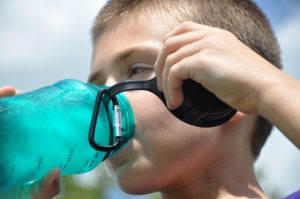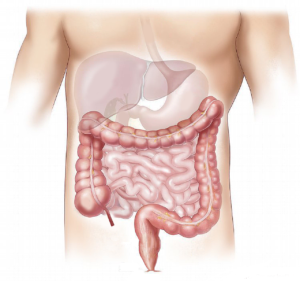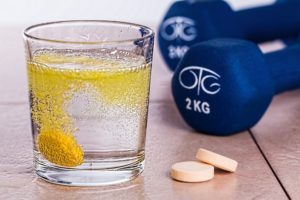Sport Fuel Products: What to Use, What to Avoid
My son is playing hockey at college and I just learned that he gets pre-workout (energy) drinks and electrolyte drinks for free via a company that sells to athletes.
Once he said the name I remembered that when he was younger the coaches were “pushing” these MLM (multi- level marketing) products on all the parents and players to use.
What upsets me is that many believe that these products are of high quality. They are not unfortunately. There are many healthier products out there that can give you the same or better results without the negative consequences from added ingredients that these products have.
Without naming the brand or company, I am going to share what should not be in the sport products you are your child, teen or young adult athlete uses and why and what to use instead. I’ll tell you what I sent to my son to use in place of this MLM Sport Brand.
Workout Products:
What You Should Be Looking at On the Label
Bad Product 1: The Pre-Workout Product
This one has two significant downsides:
1. Caffeine and its effect on adolescents, teens and college students:
We all know caffeine can help athletic performance and this has been shown in numerous studies. Heck, I’m sure you even need your daily dose of caffeine and that’s just to get your day started! This product has caffeine at 120 mg. per serving. One cup of coffee can contain in the range of 144 mg. to 333 mg. of caffeine. So not bad, in and of itself.
I even like some caffeine before a long run and it does have a positive effect on athletic performance. But we need to consider a couple things: how much caffeine is the person getting in their day in addition to the caffeine in this product and the form of caffeine. (read below, yes, the form matters greatly)
If you consume 300 mg. or more of caffeine per day it may be disturbing your sleep, contributing to anxiety and may increase your risk for heart disease. Since we are all biochemically different your detox of caffeine will differ from someone else’s ability to detox caffeine.
The odds are that this is not their only source of caffeine for the day. You would be surprised to know how many of these kids, teens and young adults consume energy drinks, caffeinated soda and energy shots on a regular basis. Studies on children who consume caffeine showed that the rate of depression and anxiety coincided with frequent caffeine consumption. I’m not even sure why children with endless amounts of energy even need caffeine.
Studies also show that taking as little as 100 mg. of caffeine can cause a significant decline in recall and reasoning, so while many high school and college students think it helps them during studying and test taking, research shows that it lowers academic performance. Simple tasks such as assembly work may be enhanced but complex reasoning skills are decreased.
Bottom Line: When adding in a pre-workout sport drink, read the back label and note how much caffeine it contains and how much caffeine you are consuming outside of this drink. The 120 mg. provided in this product is not necessarily bad if you are not consuming a lot of caffeine outside of this product, but I still don’t approve this product because of the form of caffeine (read below).
If you are consuming a lot of caffeine in your day, you need to start asking why because if you NEED caffeine to get through the day, you have other issues and your body needs nutritional support.
If you have your 23 and me raw data, your CYP1A2 can tell you if genetically you are a fast, slow or moderate metabolizer of caffeine. For instance, I am a fast metabolizer of caffeine and thus have high activity of this enzyme.
2. It is synthetic caffeine and yes, this is VERY important!
Not all caffeine is the same. There is natural caffeine and synthetic caffeine. Synthetic caffeine is the cheapest form and therefore you see it in energy drinks, soda and sport drinks.
It is absorbed much faster through your digestive tract and therefore you get a quick spike in energy which may seem like a plus when you are ready to go play a sport,
BUT the downside is….
that you feel the crash all that much faster and harder too.
Caffeine in a natural state, such as in yerba mate or green tea, provides a balanced caffeine lift due to the presence of naturally occurring nutrients in the plant. Coffee and other teas will also provide this type of energy lift versus the high energy and then crash and fatigue feeling from a synthetic form.
In the synthetic form, you are more likely to notice negative side effects, such as difficulty sleeping, nervousness and heart palpations. Do you want that for your child?
Synthetic caffeine is not the same as caffeine from coffee beans or from herbs for another reason. It is typically exposed to harsh chemicals during production which means you, in the end, consume these chemicals unknowingly. Synthetic caffeine can also be produced in unregulated foreign labs and factories that do not keep record of handling procedures which means you may be getting more chemicals in that drink than you realize.
Natural caffeine such as in tea or organic coffee (don’t buy non-organic coffee as it is heavily sprayed crop) also contains antioxidants which has many health benefits.
The caffeine that is found in synthetic form can provide a much more potent caffeine isolate compared to the caffeine found in a whole plant.
Think this: You want long lasting, sustained and focused energy. Choose caffeine from a natural source.
Bottom line: If you don’t mind chemicals and a crash of fatigue once the synthetic caffeine wears off than I guess go for it, but if you do, you have better, healthier and safer options out there. Remember when the ingredient label says “caffeine” without saying the source, know that it is cheap and synthetic.
3. Sucralose: No one needs or should consume artificial sweeteners and here is why:
Honestly this makes my blood boil. Why do we need these artificial sweeteners in our foods and why in products for athletes? Because they are trying to make it taste really, really sweet without adding more sugar!
This problem we have that everything must taste super sweet I am not even going to go into. Instead let’s focus on why your child, teen or young adult should avoid artificial sweetener like the plague.
The concerns with sucralose use include toxicity, DNA damage, gut damage, destroys beneficial bacteria, alters glucose and insulin and can lead to type 2 diabetes, and carcinogenic potential (when used in cooking such as with Splenda).
You have got to read labels. I cannot tell you how many people tell me what they are using is a healthy product and then I read the label and lo and behold, there is sucralose on the label. And yes, it is in your child’s sport drink. In fact, it is in thousands of products and therefore label reading is so important!
You probably know by now that drinking or eating something with sucralose is not going to help you lose weight. Most likely your athlete is not concerned with losing weight so probably doesn’t care one way or another that it is in his or her sport drink. But you should care!
While destroying gut health may not seem like a big deal to you, it should be. Sucralose has been found to kill as much as 50% of your microbiome. This opens you up to a world of problems; everything from intestinal permeability, autoimmune disease, poor immune function and mental health issue. Yes, all that can happen from not having a healthy gut.
You may have heard that sucralose passes through the digestive tract unchanged and therefore is safe to consume. New research has shown that it is metabolized in your gut. It works in the same manner as would hydrogenated oils.
By this I mean both are synthetic foods created in labs. Without going into the science, there is no enzyme to break down this sugar. That is because it is not a food provided by natural means. Our body doesn’t have an enzyme to break it down. Your body doesn’t even recognize it and doesn’t even know what to do with it!
Thus, they once thought it just passes through the digestive tract, but much like hydrogenated oil (we don’t have an enzyme to break down this synthetic fat) we can’t break it down. It doesn’t just pass through the body but instead circulates creating havoc in the body.
Research indicates that about 15% of the sucralose gets stored in the body. What happens when it gets stored in the body? Makers of Splenda and these products I’m sure would assure you that nothing happens. But you are smarter than that. Nothing synthetic just sits there and is safe.
What I prefer: I sent my son a product from Hammer Nutrition that I like (I don’t sell it, have no affiliation). It is called Fully Charged. It has very little caffeine at 15 milligrams and contains a blend of fruit, vegetables and herbs and beet juice powder. This product would be taken like this MLM product, adding a scoop to water about 15-20 minutes before the game or workout.
I also like, if the person still needs a little more energy support, is Energy by Now brand. (Again, no affiliation and I could sell this, but I do not). This has some natural caffeine from Guarana extract, green tea extract and yerba mate. It comes out to about 60 mg. of natural sourced caffeine.
Thus, the two products used together before a game would come out to about 75 mg. of natural caffeine. This would 50 mg. less than what the other product has and also note that it is naturally sourced!
What I also like about the Energy by Now is that it has added adaptogens that help the body adapt to the stress of exercise.
A Red Bull will have 80 mg. of caffeine and a Rock Star will have 75 mg. of caffeine. While the differences in caffeine are not much I would not recommend these products. I went looking on the web and on the Red Bull site to see the actual label on the can and it sent me in circles on their site and never gave me a breakdown of all the ingredients. I don’t trust products like that as it has something to hide, in my opinion. Plus, energy drinks are usually loaded with sugar and don’t contain the benefit of Adaptogenic herbs in the right forms and amounts since these products typically use cheap ingredients.
If you want to know more about Energy Drinks and Guarana, read this article http://trufoodsnutrition.com/4446-2
Bottom Line: Without going into detail on each of the dangers of sucralose consumption, it is best just to know it is not good for your health and should be avoided. Don’t go to a product that has a different artificial sweetener such as with Acesulfame potassium or aspartame. Use sport products that are naturally sweetened with monk fruit, stevia or fruits. Be mindful of the amount of caffeine in your day.
Bad Product #2: The Electrolyte Drink
It is a powder product that provides electrolytes for hydration after sports and during and after heavy sweating. This is a good thing.
Unfortunately, it also contains sucralose. In fact, all the powder products by this company contain sucralose even the protein powders. I just don’t get it.
But if that wasn’t reason enough to avoid it, here is another one…
Sugars:
Maltodextrin, dextrose and fructose are the first three ingredients on the label and all are sugars. Yes, many athletes need to fuel and having some sugars after a sport is not necessarily a bad thing in small doses.
Dextrose and Maltodextrin have higher glycemic indexes than sucrose and while it can provide a quick energy boost during or after the game, it can result in low blood sugar.
What I prefer: I love Ultima. I have sent this product to my son and I use this on runs on hot days in the summer. It is a powder product just like this other brand and it is super easy to just add some to water.
I like this product because it lists the amount of all the electrolytes you are getting in the product. This other one only lists the amounts for sodium and potassium. Why?
Ultima comes in several flavors, tastes good and has added nutrients. It is naturally sweet and there are no artificial sweeteners. Yeah!
It does not contain any sucrose, dextrose fructose or Maltodextrin. Need a little natural sugar with your electrolyte drink after a sport? Have a banana or orange slices.
Remember when your kids were young and parents bought fruit for the kids to have after their soccer games? Yup, that’s all you still really need; none of this added “crap”.
An alternative, are electrolyte tablets. They will dissolve if you keep them in your pocket while working out as the sweat will dissolve them (so will water). I put them in a small baggie and then put in my pocket. These are easy and great to take with water. There are several good brands out there.
Bottom Line: When buying an electrolyte drink to replace lost electrolytes after a sport or working out, choose products that list the amount of each electrolyte and one that does not contain added sugar or artificial sugar.
You must read labels. Get past the hype on the front of the package or what the “rep” is telling you. For instance, this product has many professional athletes on their website saying how great these products are.
I really don’t care.
They aren’t nutritionists, nor do they do the research, so they also don’t realize the damage that some of the ingredients in the products can do.
Just because a professional athlete is taking it, does not mean your child should. Do your own homework and research or ask a nutrition professional what they think of the product.
I’d love to hear what you or your youth, teen or adult athlete uses.
Sources
Cherniske, S. (1998) Caffeine Blues. NY: Grand Central Publishing
Haas, E. (2006) Staying Healthy with Nutrition. The Complete Guide to Diet and Nutritional Medicine.
CA: Celestial Arts:
https://www.ncbi.nlm.nih.gov/pubmed/22339647
https://examine.com/supplements/caffeine/
https://articles.mercola.com/sites/articles/archive/2013/12/18/sucralose-side-effects.aspx
https://articles.mercola.com/sites/articles/archive/2013/06/26/cspi-downgrades-splenda.aspx





Leave A Comment
You must be logged in to post a comment.